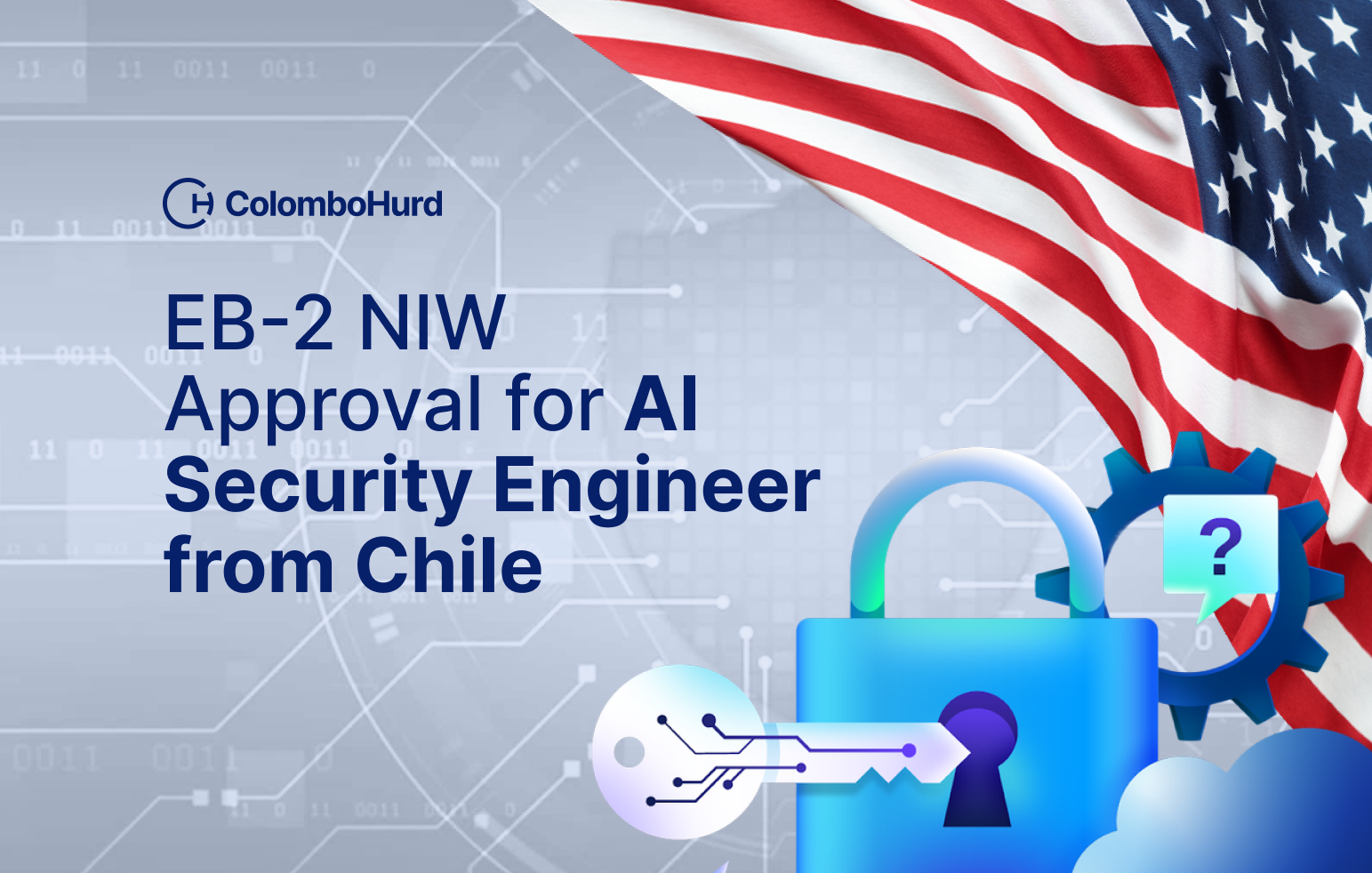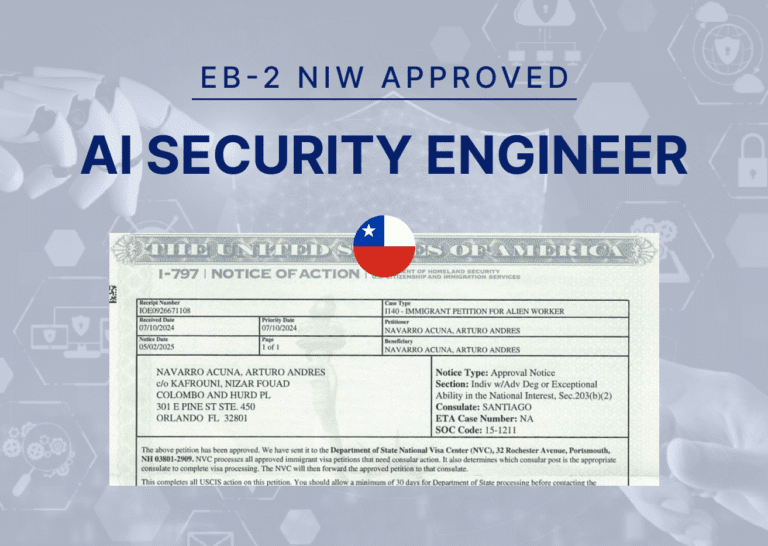AI Security Engineer
As artificial intelligence becomes central to U.S. defense, finance, and critical infrastructure, the need for advanced AI security has never been greater. This case study highlights how our client, an AI security engineer from Chile who specializes in intelligent defense systems that detect and neutralize cyber threats, secured an EB-2 National Interest Waiver (NIW) after receiving a Request for Evidence (RFE).
Represented by attorneys Wil Safrit and Nizar Kafrouni of Colombo & Hurd, the legal team successfully demonstrated that his work directly supports key U.S. federal priorities in AI and cybersecurity. By strategically reframing the case and providing targeted evidence, they proved that his continued contributions are essential to protecting U.S. infrastructure and advancing AI security innovation.

From Software Engineering to AI Security Expertise
Our client built an 11-year career at the intersection of software engineering and cybersecurity. He holds a master’s degree in information technology and management, a Postgraduate Degree in Informatics Management, and a bachelor’s in computer Execution Engineering, qualifying under the STEM category for Computer Engineering.
Over the years, he led complex technology projects for financial institutions, including API migration for major banks, security architecture for retirement investment platforms, and AI integration for threat detection systems. His work focused on solving one critical challenge: how to protect digital infrastructure before attacks happen.
His experience eventually led him to specialize in AI security, using artificial intelligence to analyze system vulnerabilities, identify suspicious behavior, and automate rapid defense responses. Long before applying for the EB-2 NIW, he was already working with U.S.-based companies on AI-driven security integrations.
As attorney Wil Safrit describes: “He had a proven record of building intelligent security systems that protect financial platforms and prevent data breaches. His work wasn’t just theoretical; it was already being implemented to support real-world security needs.”
When USCIS Challenged All Three Prongs
Even with a strong initial filing, USCIS was not immediately convinced that our client’s work in AI security had a direct impact on the United States. The agency issued a Request for Evidence (RFE) asking for deeper proof that his work addressed a critical national need and that he was well-positioned to continue making an impact in the U.S.
At the heart of the challenge was one question: How essential is his AI security work to protecting U.S. infrastructure and national security?
To move the case forward, our legal team had to address three key issues:
- Relevance to U.S. priorities – Show that his AI security systems directly support U.S. cybersecurity strategies and national security initiatives.
- Why him – Demonstrate that he brings experience and technical leadership that goes beyond that of a typical engineer.
- Why now – Explain why waiting for employer sponsorship would slow urgent innovation in AI security, an area where the U.S. is actively seeking immediate leadership.
USCIS wanted more than qualifications: they wanted evidence of real-world impact and national importance. The RFE made it clear that the case had to be reframed around security needs, innovation, and urgency.
Reframing the case
Faced with an RFE challenging all three prongs of Matter of Dhanasar, the legal team demonstrated that our client’s work directly supports national security efforts already in motion. They linked his AI security systems to federal initiatives like the Executive Order on Maintaining American Leadership in Artificial Intelligence, the Department of State’s Enterprise AI Strategy, and CISA’s 2025–2026 International Strategic Plan.
These policies demonstrate that the United States is actively investing in AI defenses to protect critical infrastructure, and our client is already contributing to this effort. To reinforce this, the team included new testimonial letters from AI and cybersecurity leaders describing the measurable impact of his work, along with a letter from his U.S.-based employer confirming immediate plans to implement his technology.
Attorney Wil Safrit explained that building a strong national importance argument begins with understanding where the United States places its priorities: “As is certainly evident in here, proclamations and orders from the White House make it abundantly clear: maintaining U.S. leadership in AI is a national priority tied to economic strength, public safety, and global competitiveness. Our client’s work in AI security systems directly supports that mission by putting advanced technologies into practice where they matter most.”
By reframing the evidence and clarifying urgency, the legal team presented a compelling case that our client’s continued work in the United States serves the national interest.
See if you qualify
Get your free EB-2 NIW visa profile evaluation today.
Advancing AI Security in the United States
USCIS approved our client’s EB-2 NIW, recognizing the importance of his work in AI security and intelligent defense systems. The approval allows him to continue developing technology that strengthens the protection of U.S. infrastructure, without the delays of traditional employer sponsorship.
With this immigration stability, he is now expanding collaborations with U.S. technology firms and security-focused organizations working to prevent cyberattacks and safeguard sensitive systems. The approval also opens doors to future opportunities, including partnerships with research institutions, potential access to federal innovation initiatives, and broader participation in national AI and cybersecurity programs.
Instead of stepping away from critical work due to immigration challenges, he is now positioned to accelerate innovation and contribute to U.S. security readiness in real time.
“Proclamations and orders from the White House make it abundantly clear: maintaining U.S. leadership in AI is a national priority tied to economic strength, public safety, and global competitiveness. Our client’s work in AI security systems directly supports that mission by putting advanced technologies into practice where they matter most.”


